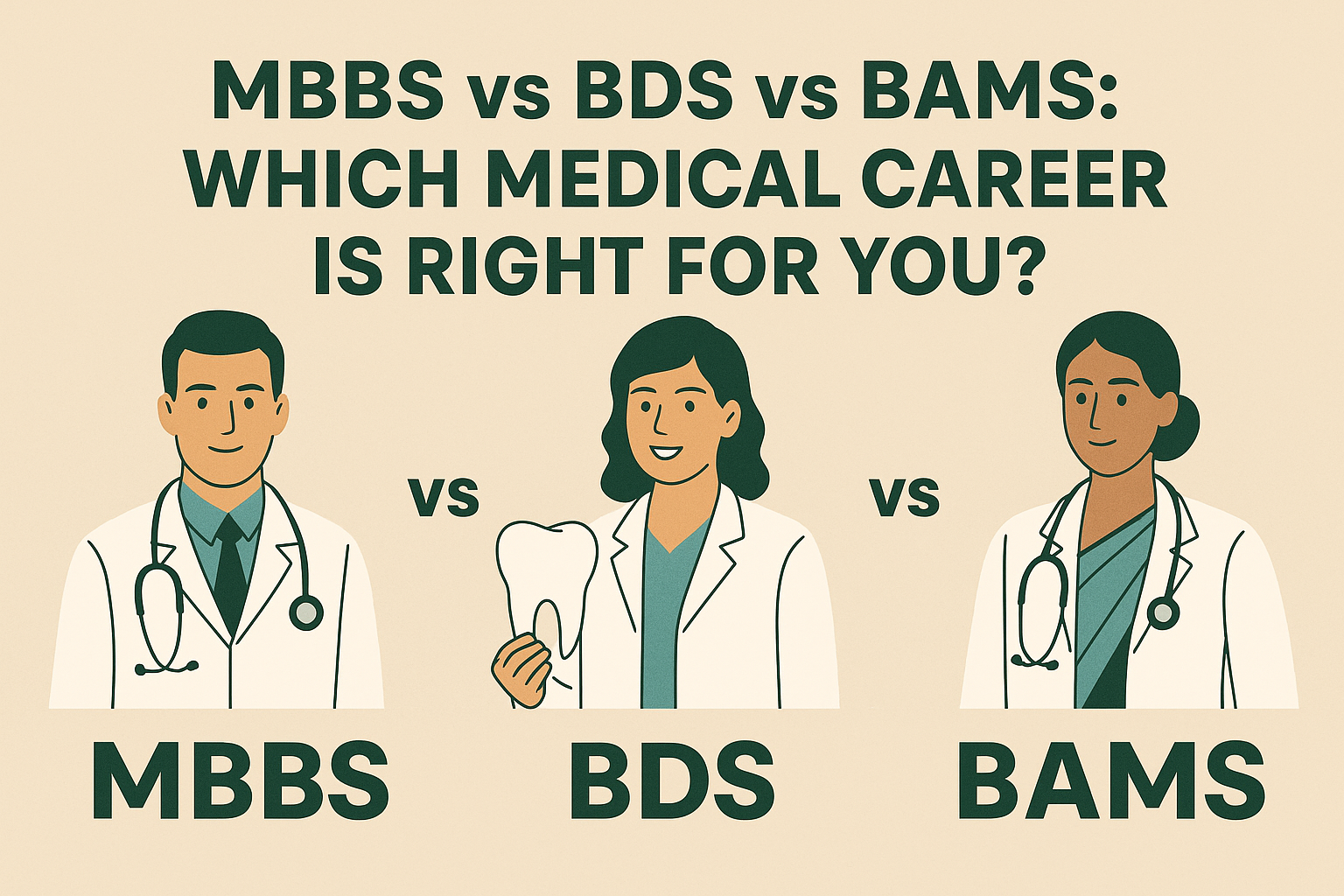
MBBS vs BDS vs BAMS: Which Medical Career Is Right for You?
In India, medical education offers several pathways to a fulfilling and impactful career. Among the most popular options are MBBS (Bachelor of Medicine and Bachelor of Surgery), BDS (Bachelor of Dental Surgery), and BAMS (Bachelor of Ayurvedic Medicine and Surgery). Each of these fields provides distinct career opportunities, with varied scopes, academic requirements, and job prospects. But how do you choose the right one? Let’s explore these career paths to help you make an informed decision. MBBS Admission in India
1. What is MBBS?
MBBS is the most recognized and traditional medical career. It is a five-and-a-half-year course, including an internship. MBBS graduates are trained to become doctors in the allopathic system of medicine, diagnosing, treating, and preventing diseases.
- Eligibility: After clearing NEET UG, candidates can pursue MBBS in top medical colleges across India.
- Duration: 5.5 years (including internship).
- Scope: MBBS opens doors to a wide range of specialties, including surgery, pediatrics, internal medicine, and cardiology. Graduates can work in hospitals, clinics, or research fields and can also pursue MD (Doctor of Medicine) or MS (Master of Surgery) for specialization.
Top Ranking Keywords: MBBS Admission in India, MBBS Colleges in India, NEET UG, MBBS Fees Structure, MBBS Direct Admission, Top MBBS Colleges.
2. What is BDS?
BDS is the degree awarded to students who wish to pursue a career in dentistry. The course duration is typically five years, which includes clinical practice. Dental surgeons are trained to diagnose and treat oral health issues, including teeth, gums, and related structures.
- Eligibility: Similar to MBBS, BDS admission requires NEET UG scores for most colleges in India.
- Duration: 5 years (including internship).
- Scope: A BDS graduate can practice as a dentist, pursue higher education in MDS (Master of Dental Surgery), or specialize in fields like orthodontics, oral surgery, and periodontics. They can also open their own dental practice.
Top Ranking Keywords: BDS Admission, Dental Colleges in India, BDS Fees Structure, Top BDS Colleges, BDS Direct Admission, NEET UG for BDS.
3. What is BAMS?
BAMS is a degree in Ayurvedic Medicine and Surgery. It focuses on the ancient system of medicine practiced in India, blending traditional and modern healthcare approaches. This course combines theoretical knowledge with practical training in Ayurvedic treatments.
- Eligibility: BAMS admission also requires a NEET UG score. It is available in many reputed Ayurvedic colleges across the country.
- Duration: 5.5 years (including internship).
- Scope: BAMS graduates become Ayurvedic doctors, offering treatments for a wide range of health problems through Ayurvedic methods. There is also scope for research, teaching, and entering into private practice. BAMS is gaining significant popularity due to the increasing demand for alternative medicine.
Top Ranking Keywords: BAMS Admission in India, Top BAMS Colleges, Ayurvedic Medicine Degree, BAMS Course Details, BAMS Career Opportunities.
Comparison: MBBS vs BDS vs BAMS
1. Career Opportunities
- MBBS: MBBS offers the broadest career options, ranging from hospital jobs to private practice. Specialists like cardiologists, neurologists, and surgeons all begin with an MBBS degree. Graduates can pursue postgraduate degrees (MD/MS) to specialize further.
- BDS: Dentists can work in both government and private hospitals or set up their own clinics. The demand for dental health is rising, and with the right qualifications (MDS), there are numerous opportunities in this field.
- BAMS: With a growing awareness of holistic health, BAMS practitioners are sought after for their expertise in Ayurvedic medicine. Additionally, career options extend to teaching, research, and healthcare management.
2. Earning Potential
- MBBS: Doctors in private hospitals and clinics earn substantial salaries, especially those with specializations. A well-established doctor can also generate income from their own practice.
- BDS: Dentists can earn well, particularly in urban areas. Dental surgeons with an MDS qualification earn even higher salaries due to specialization.
- BAMS: The earnings of BAMS professionals are growing, particularly with the rise of Ayurvedic treatments in urban areas. The salary varies depending on the expertise and the place of work.
3. Job Market & Demand
- MBBS: The job market for MBBS graduates is huge, with hospitals, clinics, and research institutions constantly in need of doctors.
- BDS: Dental professionals are always in demand, especially in metropolitan cities, where private practices and corporate dental clinics are booming.
- BAMS: The demand for Ayurvedic practitioners is increasing as more people turn towards natural and traditional medicine for their healthcare needs. Government initiatives supporting alternative medicine also contribute to the growth of this sector.
Conclusion: Which Career Is Right for You?
Choosing between MBBS, BDS, and BAMS depends on your interests, career goals, and passion for medicine. If you’re drawn to traditional allopathic medicine and want a broad range of career opportunities, MBBS is a great choice. If you are passionate about oral health and dentistry, BDS might be your ideal path. On the other hand, if you have a deep interest in natural healing and traditional medicine, BAMS offers a unique career opportunity.
Each of these career paths has its own set of challenges and rewards. Ultimately, the decision should be based on where your interests lie and what kind of impact you want to make in the healthcare field.
